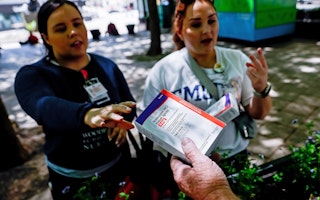Incarceration Should Not Be a Death Sentence
By Giada Girelli

Andrea Circle Bear, a 30-year-old indigenous woman from South Dakota, was five months pregnant when she was sentenced to two years’ imprisonment for “maintaining a drug involved premise” earlier this year. Three months later, on April 28, she was declared dead. She became the first female prisoner to die of COVID-19 in a federal prison in the United States.
Andrea’s story lays bare the inhumane excesses of the drug war. There is no rational reason a pregnant mother of five, with preexisting health conditions, should have been in prison for a minor drug offense. Her death is a grotesque demonstration of the violent and fatal intersection between drug control, incarceration, and racism.
Andrea was one of the two million people imprisoned around the world for a drug offense. The rapid spread of COVID-19, and the essential role of social distancing, placed an unprecedented spotlight on jails and prisons, where isolation is impossible. It also sparked intense debate on incarceration, criminalization, and the linkages [PDF] between prison health and public health. International actors called upon governments to urgently reduce overcrowding and release prisoners, particularly those who had preexisting health conditions or were detained for minor offenses, such as drug-related offenses.
Reports of government commitments to amnesties, diversion, and early release schemes began to emerge in March, generating hope that states might rethink excessive practices of incarceration. Three months later, new research from Harm Reduction International reveals that, thus far, the majority of these commitments to public health and prison decongestion appear to have been little more than talk.
Harm Reduction International tracked prison decongestion measures adopted around the world in response to COVID-19, between March and June 2020, finding that roughly 640,000 people were released in 109 countries. This corresponds to a mere 5.8 percent of the global prison population, notwithstanding the fact that 62 of these countries report COVID-19 cases in their prisons.
Alarmingly, the effectiveness of prison decongestion schemes was hampered by policy shortcomings, bureaucratic hurdles, or simply a lack of political commitment—revealing governments’ overarching preoccupation with punishment over public health, even during a global pandemic.
This preoccupation was perhaps best demonstrated by the fact that at least 28 countries excluded prisoners incarcerated for drug-related activities from release, regardless of preexisting health conditions, age, or the capacity of the prison system to protect prisoners and staff from the virus. According to the study, only one-third of countries prioritized prisoners with preexisting health conditions such as HIV, tuberculosis, disabilities, or other chronic and terminal illnesses.
In several countries, authorities failed to translate political commitments into practice. In the United Kingdom, for example, only 57 people have benefitted from the decongestion scheme announced by the government in April (which should have impacted some 4,000 people). Even worse, juveniles in prison for drug offenses were explicitly excluded [PDF] from the release scheme.
In Cambodia, meanwhile, the interior minister’s announcement of a plan to release around 10,000 individuals has not been implemented. In a country with severe prison overcrowding, driven by a violent antidrug campaign and the indiscriminate use of pretrial detention, inaction will be fatal. And in Mexico, according to local sources, none of the people released were freed pursuant to the amnesty law adopted in response to the spread of COVID-19, but rather by application of preexisting mechanisms.
These measures are achieving far too little, far too late. In many countries, police continue to arrest and detain people during the emergency. The current crisis coincides with an unprecedented scrutiny of public expenditure on criminal justice. If we want a vision of a better model, we should look at calls made by the Black Lives Matter movement for a better criminal justice system—including investments in communities to ensure Black people not only survive, but thrive.
With an ongoing global health crisis, and a looming economic recession, states have the opportunity (and responsibility) to rethink ineffective and harmful policies, and to invest in community health. Nonviolent drug offenses are the place to start unravelling these systems of punishment and control.
Harm Reduction International is a grantee of the Open Society Foundations.
Giada Girelli is a human rights analyst at Harm Reduction International.


